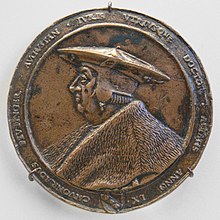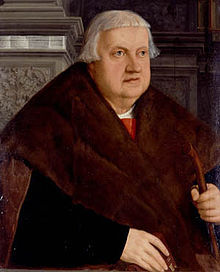Konrad Peutinger


Konrad Peutinger (born October 14, 1465 in Augsburg ; † December 28, 1547 there ) was a lawyer , humanist and antiquarian . As Augsburg town clerk , he was one of the most important politicians in the imperial city during the Reformation. He was an advisor to Emperor Maximilian I and his successor, Emperor Charles V.
Life
Peutinger came from a respected merchant family in the imperial city of Augsburg. After studying in Bologna and Padua , where he received his doctorate in both rights , he embarked on a career as a lawyer. In doing so, he got to know the movement of Renaissance humanism more closely, which was to accompany him throughout his life. In 1493 he was elected syndic in his native Augsburg. As a representative of the same, he attended several diets such as B. the Reichstag in Worms (1521) and was appointed imperial councilor by Maximilian I. Peutinger was also town clerk in Augsburg from 1497 to 1534, where in 1515 he acquired a property that was still preserved, the so-called Peutingerhaus . Even if the connections to Maximilian's successor Karl V were looser, Peutinger was able to maintain his position in Augsburg as well as on a supraregional level. It was not until 1534, when the Reformation was introduced in Augsburg after the failure of his policy aimed at a compromise between the conflicting religious parties, that he resigned from his office as town clerk. He died in Augsburg on December 28, 1547. Previously he was raised to the hereditary nobility by Emperor Charles V.
In addition to maintaining contacts with other humanistic scholars such as B. Erasmus from Rotterdam , Peutinger obtained the connections to Italy in order to continue to get numerous new books of legal or humanistic, that is also old-language- philological content. Peutinger was not only interested in books from Italy, he also had contacts with printers in his hometown of Augsburg, Basel and Strasbourg . He may have been in contact with the humanist Jacob Sturm through the Strasbourgers . Over the years, Peutinger amassed an extremely substantial library. His friends also included the Nuremberg merchant and humanist Willibald Pirckheimer , who in turn was friends with the famous painter Albrecht Dürer . The compilation of a library that was unusually large for the time corresponds to this mindset.
Peutinger was present at the Diet of Worms in 1521 during the negotiation of the "Causa Lutheri". His report on this negotiation for the Augsburg council has been preserved and is an important source for the actual course of the negotiation in which Martin Luther refused to deny his writings. This report is u. a. edited by the church historian Theodor von Kolde in his "Analecta Lutherana" .
When at the Reichstag in Augsburg in 1530 the Nuremberg merchants and the Fuggers were accused of usury and abuse of monopoly, the lawyer Konrad Peutinger appeared as the merchants' defense. He spoke out against intervention by the state in price formation and rejected the responsibility of the wholesale merchants for the price increases in the Reich. He argued with the right to free entrepreneurship and emphasized that the economic pursuit of self-interest ( propria utilitas ) stimulates the economy as a whole and thus leads to an increased common good ( commoditas publica ). In doing so, he took a line of argument that would later become the basis of capitalism and the free market economy . Nevertheless, the Reichstag passed a ban on monopoly, which, however , was never enforced against the Fuggers and Welsers due to their importance for Emperor Charles V.
His collections of ancient remains and his writings on research into Roman antiquity in his home region were of particular importance for the development of historical science. Parts of his collection of Roman stone monuments can still be seen in his Augsburg house, the so-called Peutingerhaus . His work Inscriptiones Romanae (Augsburg 1520) and the Tabula Peutingeriana named after him , a late antique road map of the Roman Empire , which later turned out to be one of the most important sources from this period, are of paramount importance . Peutinger had received the map from Conrad Celtis in Vienna in 1507 and then prepared a publication which, however, only came about after his death. He also wrote the first edition of the Historia Gothorum des Jordanes and the Historia gentis Langobardorum by Paulus Diaconus .
In his hometown Augsburg the Peutinger-Gymnasium reminds of him to this day .
Family and offspring
Peutinger married Margarete Welser on December 27, 1499 , who brought a considerable fortune from the Welser family into the marriage and was to outlive him by five years. The marriage had at least eight children.
- Juliana Peutinger (1500–1506), a gifted “child prodigy”, gave a Latin speech to Emperor Maximilian I in 1504 .
- Constantia Peutinger (1503-1546)
- Claudius Pius Peutinger (October 28, 1509–1552)
- Christoph Peutinger (1511–11 April 1576)
- Chrisostomus Peutinger (1512–1577)
- Johann Chrisostomus Peutinger (1513; date of death unknown)
- Carl Peutinger (1515–1564)
- Conrad Pius Peutinger (1520-1613)
Sources and text editions
16th century editions
- Konrad Peutinger: Romanae vetustatis fragmenta , Augsburg 1505
- Konrad Peutinger: Inscriptiones Vetustae Romanae Et Earum Fragmenta In Augusta Vindelicorum Et Eius Diocesi , [Mainz] 1520 (revised version)
Modern editions of sources and works by Peutinger
- Erich König (Ed.): Konrad Peutinger's correspondence. CH Beck, Munich 1923 (critical edition; digitized version )
- Hans-Jörg Künast (ed.): The library and the handwritten estate of Konrad Peutinger. Part 1: Konrad Peutinger's library. Edition of the historical catalogs and reconstruction of the holdings. Niemeyer, Tübingen 2003 ff.
- Volume 1: Hans-Jörg Künast, Helmut Zäh: Peutinger's autograph catalogs, the non-legal library part (= Studia Augustana. Vol. 11). 2003, ISBN 3-484-16511-1 ;
- Volume 2: Hans-Jörg Künast among others: The autograph catalogs of Peutinger, the legal library part (= Studia Augustana. Vol. 14). 2005, ISBN 3-484-16514-6 .
literature
- Werner Bischler: The emperor's husband just in case. The town clerk Konrad Peutinger. In: Augsburg history (s). Volume 1. Wissner, Augsburg 1994, ISBN 3-928898-73-6 , pp. 47-55.
- Monika Grünberg-Dröge: Konrad Peutinger. In: Biographisch-Bibliographisches Kirchenlexikon (BBKL). Volume 7, Bautz, Herzberg 1994, ISBN 3-88309-048-4 , Sp. 392-397.
- Rolf Kießling (ed.): Konrad Peutinger. A universal scholar between the late Middle Ages and early modern times: inventory and perspectives , Berlin: de Gruyter 2019 (Colloquia Augustana, 35), ISBN 978-3-11-057504-0 .
- Erich König : Peutinger Studies (= studies and representations from the field of history. Vol. 9, H. 1/2, ZDB -ID 510176-1 ). Herder, Freiburg (Breisgau) 1914 ( digitized version )
- Hans-Jörg Künast, Jan-Dirk Müller: Peutinger, Conrad. In: New German Biography (NDB). Volume 20, Duncker & Humblot, Berlin 2001, ISBN 3-428-00201-6 , pp. 282-284 ( digitized version ).
- Heinrich Lutz : Conrad Peutinger : Contributions to a political biography. Die Brigg, Augsburg 1958, DNB 453117279 (= Treatises on the history of the city of Augsburg , Volume 9, ISSN 0724-9829 , also dissertation at the University of Munich , 1953, DNB 480435413 )
- Martin Ott: The discovery of antiquity. Dealing with the Roman past of southern Germany in the 16th century (= Munich historical studies, Bavarian history department. Vol. 17). Lassleben, Kallmünz 2002, ISBN 3-7847-3017-5 (also dissertation, University of Munich 2000), in particular the chapter The Augsburg inscription sylloge by Konrad Peutinger , pp. 100–122.
- Collected memory. Konrad Peutinger and the cultural tradition in the 16th century. Accompanying publication to the exhibition of the Augsburg State and City Library on the occasion of Konrad Peutinger's 550th birthday (Augsburg State and City Library. Cimeliensaal 1) . Edited by Reinhard Laube and Helmut Zäh. Lucerne 2016.
Web links
- Literature by and about Konrad Peutinger in the catalog of the German National Library
- http://www.philological.bham.ac.uk/bibliography/p.html
Individual evidence
- ↑ Pastperfect: Konrad Peutinger's Business Ethos , Speyer: 1530 , web project of the History Faculty of the University of Vienna
| personal data | |
|---|---|
| SURNAME | Peutinger, Konrad |
| ALTERNATIVE NAMES | Peutinger, Conrad |
| BRIEF DESCRIPTION | German politician |
| DATE OF BIRTH | October 14, 1465 |
| PLACE OF BIRTH | augsburg |
| DATE OF DEATH | December 28, 1547 |
| Place of death | augsburg |


